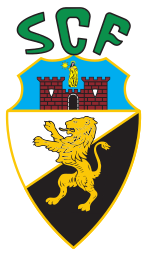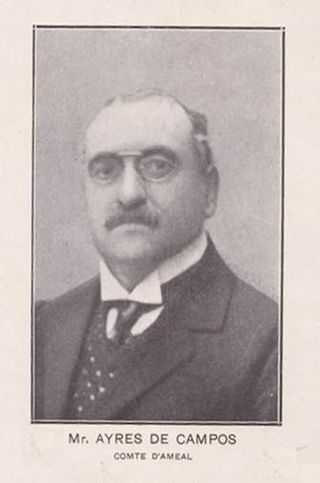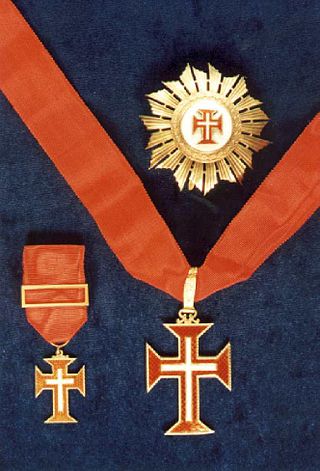Related Research Articles
Joaquim Jorge de Magalhães Saraiva da Mota was a Portuguese lawyer and politician.

Sporting Clube Farense, simply known as Farense, is a Portuguese professional football club based in Faro in the district of the same name and the region of Algarve. Founded in 1910, the club will play the 2023–24 season in the Primeira Liga after promotion from the Liga Portugal 2.

The Counts of Ribeira Grande was a title of nobility granted to a hereditary line of nobles from the island of São Miguel in the Portuguese archipelago of the Azores, most closely associated with the Gonçalves da Câmara familial line. The title was first conferred to D. Manuel Luís Baltazar da Câmara in 1662, and his branch of the Câmara dynastic family continued to receive the title long after the extinction of noble titles in 1910.

Count of Ameal is a Portuguese title of nobility held by the Ayres de Campos family.

João Maria Correia Ayres de Campos, 1st Count of Ameal, GCC, CvNSC, OOPA was a Portuguese politician and antiquarian, best known as a great art collector, maecenas and bibliophile. He is renowned chiefly for having assembled one of Portugal's largest and most important private art collections, as well as what was at the time the largest private library in the country; his collections are also famous for having been auctioned en masse after his death in 1920, leading to the largest auction recorded in the Iberian peninsula on that decade. Several pieces belonging to him have since been incorporated in the collections of the Louvre, the Prado, the Museu Nacional de Arte Antiga in Lisbon and the Soares dos Reis National Museum in Porto.
António Jorge Martins da Mota Veiga was a Portuguese politician and former Minister and law professor.
Francisco José Caeiro was a Portuguese politician and former Minister and law professor.
The Count of Paço de Arcos, or alternately Count of Paço d'Arcos was a noble title, instituted by King Carlos I of Portugal on 13 October 1890, in favour of Carlos Eugénio Corrêa da Silva for his naval career and diplomatic service within the Portuguese Empire.

The noble title of Marquis de Arronches was created on 27 April 1674 by D. Afonso VI of Portugal for Henrique de Sousa Tavares, 3º conde de Miranda do Corvo. The heir presumptive to the title is the only male descendant of the family, D. Pedro Miguel Vasques Milhinhos, who due to primogeniture will be the only one eligible to succeed D. Aires Manuel to the title.
Doce Tentação is a Portuguese telenovela that started airing on TVI on 8 January 2012 and stopped broadcasting on March 9, 2013. This telenovela was authored by Sandra Santos, from Casa da Criação, a group of soap opera/series authors of Plural Entertainment. The slogan of this telenovela is "Love that bears fruit, sows envy!". The protagonists are Mariana Monteiro, Diogo Amaral, Pedro Barroso and Sofia Ribeiro.

Events in the year 1912 in Brazil.

The Ordem Militar de Cristo, the full name of which is the Military Order of Our Knights of Lord Jesus Christ, is a Portuguese honorific Order which takes its name from the extinct Order of Christ (1834), which is given for distinguished service in the performance of functions in sovereign positions or public administration, and for the judiciary and diplomacy, which is seen as being particularly distinguished.
Portugal was represented by Carlos Mendes, with the song "Verão", at the 1968 Eurovision Song Contest, which took place on 6 April in London. "Verão" was chosen as the Portuguese entry at the Grande Prémio TV da Canção Portuguesa on 4 March.

João de Sande Magalhães Mexia Ayres de Campos, 2nd Count of Ameal was a Portuguese politician and career diplomat, having served in this capacity in the Hague, and also as Secretary to Portugal's Minister of Foreign Affairs, Venceslau de Lima. He was as a key participant in the failed republican Municipal Library Elevator Coup of 1908, which targeted the Constitutional monarchy of King Charles I and what were perceived as the dictatorial powers of his then prime minister João Franco.

Tempos Modernos is a Brazilian telenovela produced and broadcast by TV Globo. It premiered on 11 January 2010, replacing Caras & Bocas, and ended on 16 July 2010, replaced by Ti Ti Ti. The series is written by Bosco Brasil, with the collaboration of Izabel de Oliveira, Maria Elisa Berredo, Mário Teixeira and Patrícia Moretzsohn.
The 2022–23 Taça da Liga was the sixteenth edition of the Taça da Liga, a football league cup competition organised by the Liga Portuguesa de Futebol Profissional and contested exclusively by clubs competing in the top two professional tiers of Portuguese football – the Primeira Liga and the Liga Portugal 2.

The Vila Rica Revolt, also known as Vila Rica Sedition, was a colonial revolt against the Portuguese crown. It took place between June 28 and July 19, 1720, in Vila Rica, a city in the Royal Captaincy of Minas de Ouro and Campos Gerais dos Cataguases, in Colonial Brazil. It is traditionally considered a nativist movement by Brazilian historiography, and one of the precursors of the so-called Minas Gerais Conspiracy. Recent reviews show that it was part of a cycle of local contestations that sought to correct errors of the administration. It is also commonly referred to as Filipe dos Santos Revolt, after one of its leaders.
References
- ↑ Various authors, "Juncal (Conde do)" in Enciclopédia Luso-Brasileira, vol. XIV, Lisboa, 1965, p. 377.